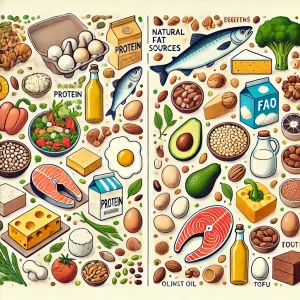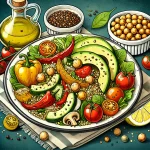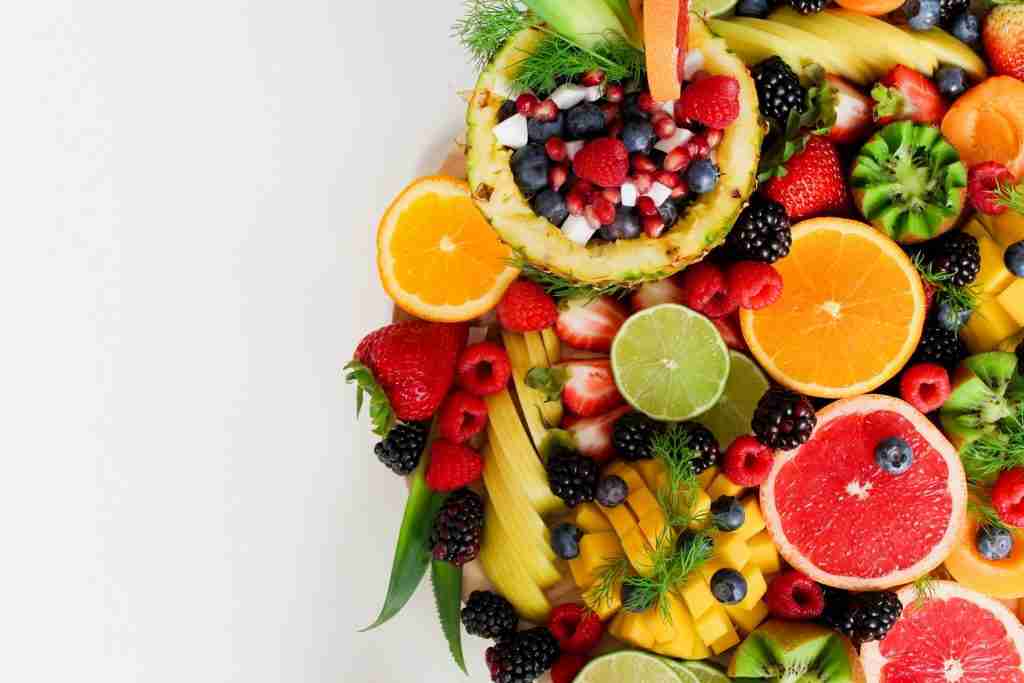In the world of nutrition, there’s often the belief that weight loss and health are as simple as “eat fewer calories, burn more calories.” However, this simplistic view overlooks the complex role various nutrients play in the body. In this comprehensive article on nutrition and postpartum recovery, we will explore why not all calories are equal and why a diet rich in natural proteins and fats, while reducing sugar and simple carbohydrate intake, can lead to better health and a leaner body.
Natural Protein and Fats are Vital for the Body

Natural proteins and fats play a crucial role in the body’s health. Proteins are the building blocks of life, essential for tissue repair, enzyme formation, and hormone synthesis. Fats serve as an important energy source for the body and are involved in numerous vital functions, including the absorption of fat-soluble vitamins and immune system support.
In contrast, sugar and simple carbohydrates are often devoid of nutrients and can cause rapid spikes in blood sugar levels, followed by quick crashes, leading to fatigue and cravings. Excessive consumption of sugar and simple carbohydrates can also increase the risk of diabetes, heart disease, and obesity.
Protein and Fats Maintain Stable Blood Sugar Levels and Promote Satiety
Studies have shown that a diet rich in natural proteins and healthy fats, while limiting the consumption of sugar and simple carbohydrates, can lead to more effective weight loss. One possible explanation is that proteins and fats can help stabilize blood sugar levels and promote feelings of fullness, resulting in reduced food intake and prolonged satiety.
A meta-analysis by Johnston et al. (2014) found that a low-carbohydrate diet was more effective for weight loss than a low-fat diet, with individuals on a low-carbohydrate diet tending to consume fewer calories without feeling hungry.
Stable Insulin Levels Facilitate Weight Loss
Insulin is a hormone produced by the body to regulate blood sugar levels and plays a crucial role in fat metabolism and storage. When we consume foods rich in sugar and carbohydrates, our blood sugar levels rise rapidly, leading to increased insulin production. Elevated insulin levels can inhibit fat burning and result in excess calories being stored as fat rather than being used for energy.
A study by Ludwig et al. (2018) found that a diet with a low glycemic index, which stabilizes blood sugar levels and minimizes insulin production, can lead to significant weight loss, particularly in the abdominal area.
Why Is a Healthy Diet Important During Postpartum Recovery?
Postpartum recovery is a sensitive phase in a woman’s life when her body recovers from the strain of pregnancy and childbirth. A balanced diet during this time can help provide the necessary nutrients for recovery and milk production. Additionally, a healthy diet can boost energy, alleviate mood swings, and improve overall well-being.
The Basics of a Healthy Diet During Postpartum Recovery
Balanced Meals: Focus on a balanced diet with a variety of fresh, unprocessed foods like fruits, vegetables, whole grains, lean protein, and healthy fats. Try to balance meals with a combination of carbohydrates, proteins, and healthy fats to provide long-lasting energy.
Hydration: Drink enough water to keep your body hydrated and support milk production. Dehydration can lead to fatigue and a sense of exhaustion, which can be particularly taxing during postpartum recovery.
Nutrient-Rich Foods: Choose foods rich in essential nutrients vital for recovery and milk production. These include dark leafy greens, legumes, nuts, seeds, whole grains, lean meats, and fish.
Snacking: Keep healthy snacks on hand to avoid hunger pangs and maintain stable blood sugar levels. Healthy snack options include nuts, fruits, vegetable sticks with hummus, yogurt, or whole-grain crackers with cheese.
Practical Tips for a Healthy Diet During Postpartum Recovery
- Prioritize natural proteins like lean meats, fish, eggs, and plant-based proteins such as beans and legumes.
- Choose healthy fats like avocados, nuts, seeds, and olive oil.
- Reduce consumption of sugary drinks, sweets, baked goods, and processed foods.
- Pay attention to the quality of carbohydrates and prefer whole grains, fruits, and vegetables.
- Meal Prep: Plan ahead and prepare healthy meals and snacks to ensure you always have healthy options on hand, even when you are short on time.
- Incorporate Superfoods: Add superfoods rich in essential nutrients to your diet, such as chia seeds, flaxseeds, berries, avocado, and quinoa.
- Listen to Your Body: Eat when you’re hungry and make sure to eat enough to meet your energy needs, especially if you are breastfeeding.
- Seek Support: Consult a professional nutritionist if necessary to ensure you are getting all the essential nutrients and that your diet is tailored to your individual needs.
Healthy Recipes for Postpartum Recovery

Green Smoothie: Blend spinach, banana, berries, almond milk, and chia seeds for a nutrient-rich smoothie that provides energy and supports milk production.
.
.
.
.

Quinoa Salad with Vegetables: Combine cooked quinoa with roasted vegetables, chickpeas, avocado, and a lemon-olive oil dressing for a balanced meal.
.
.
.

Greek Yogurt with Berries and Nuts: Serve Greek yogurt with fresh berries, chopped nuts, and a drizzle of honey for a protein-rich and delicious snack.
.
.

Salmon Fillet with Steamed Vegetables: Bake salmon fillets with lemon juice and herbs and serve with steamed vegetables like broccoli, carrots, and snap peas for a healthy and balanced meal.
.
.
Conclusion
A healthy diet during postpartum recovery is crucial for a mother’s well-being and recovery. By focusing on nutrient-rich foods, staying hydrated, and maintaining healthy eating habits, you can support your body, boost energy, and enhance mental health. With a balanced diet and practical tips, mothers can achieve optimal health and well-being during postpartum recovery.
Understanding that not all calories are equal is key to understanding how different nutrients affect the body and why a diet rich in natural proteins and fats while reducing sugar and simple carbohydrate intake, can lead to better health and a leaner body. By applying these insights to postpartum nutrition and striving for a balanced diet, we can improve our well-being and achieve a healthy weight in the long term.
References:
Johnston, C. S., Tjonn, S. L., Swan, P. D., White, A., Hutchins, H., & Sears, B. (2014). Ketogenic low-carbohydrate diets have no metabolic advantage over nonketogenic low-carbohydrate diets. The American Journal of Clinical Nutrition, 83(5), 1055-1061.
Ludwig, D. S., Hu, F. B., Tappy, L., & Brand-Miller, J. (2018). Dietary carbohydrates: role of quality and quantity in chronic disease. BMJ, 361, k2340.
The articles on health topics do not replace a visit to the doctor. You can find more information here.

Sonja ist Ernährungswissenschaftlerin und promovierte Epidemiologin mit langjähriger Erfahrung in der Gesundheitsforschung. Seit der Geburt ihrer beiden Kinder 2019 und 2023 beschäftigt sie sich intensiv mit dem Thema Rückbildung und der Thematik, wie man wieder einen gesunden und schönen Körper mit stabiler Mitte nach der Schwangerschaft bekommen kann. Sie möchte Euch helfen, nach der Schwangerschaft wieder fit zu werden!

